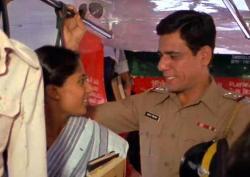When it comes to depiction of the exploitation of man on his own kind ‘brilliantly’ on celluloid, there are few peers in World Cinema who can match up to Mrinal Sen. From Calcutta 71, Chorus to Kharij, Mrigaya to Parashuram, Orie Katha Katha to Genesis, the list is long and penetrating where MS has exposed the hypocrisy and brazen exploits of humans sitting in a position of power towards the less privileged and the downtrodden of the society.
Having watched ‘Genesis’ (1986) recently, I find a continuity of thought expressed in some of his earlier works like ‘Oka Orie Katha.’ In OOK the main characters are shown as indolent primarily because they didn’t want to widen the social stratification. In Genesis, they revolt against the enslavement perpetuated by the employer class and decide to leave their job and strike out on their own. Freedom is dear to them. They are a duo who forsake their earlier menial jobs and head towards a nowhere land, one takes to farming and the other to weaving to eke out a livelihood.
Can people who value their independence remain immune to external forces and lead their lives with dignity on their own terms? The arrival of a middleman in the midst of the duo who took their product at a nominal rate to sell it in the market thereby profiting from it bring up issues of exploitation as an inevitable reality. Their peaceful existence is further complicated by the arrival of a woman in their lives.
In his film career, MS delved into the following two categories prominently in the two distinct phases in his career. The earlier phase (Calcutta trilogy, Chorus) pointed the finger of accusation at the enemy outside. In his later contemplative phase (Ek Din Pratidin, Kharij, Khandahar, Genesis), MS focused on the enemy within. The concluding sequence of ‘Genesis ‘, where bombs and detonators were used to raze the dilapidated structures, is uncannily reminiscent to the finale of Antonioni’s ‘Zabriskie Point’. The ending of the film seem to suggest that if we are unable to control the enemy inside (the duo in the film succumb to it), the enemy outside (the middleman) would become the cause of their annihilation.
The title ‘Genesis’ is intriguing. Could it possibly mean that MS is trying to tell us that the genesis of our baser instincts like ‘desire’ and ‘greed’ are the bane of freedom and human civilization. In that sense, the director seems to be reiterating the teachings of the Buddha.
The film was based on a story by Samaresh Basu. If I am not mistaken, the renowned Buddhadeb Dasgupta also made a film based on the same story (Uttara) but gave it an entirely different twist. The principal cast includes Om Puri, Naseeruddin Shah, Shabana Azmi, and M. K. Raina.
Rating: 4.5 out of 5











